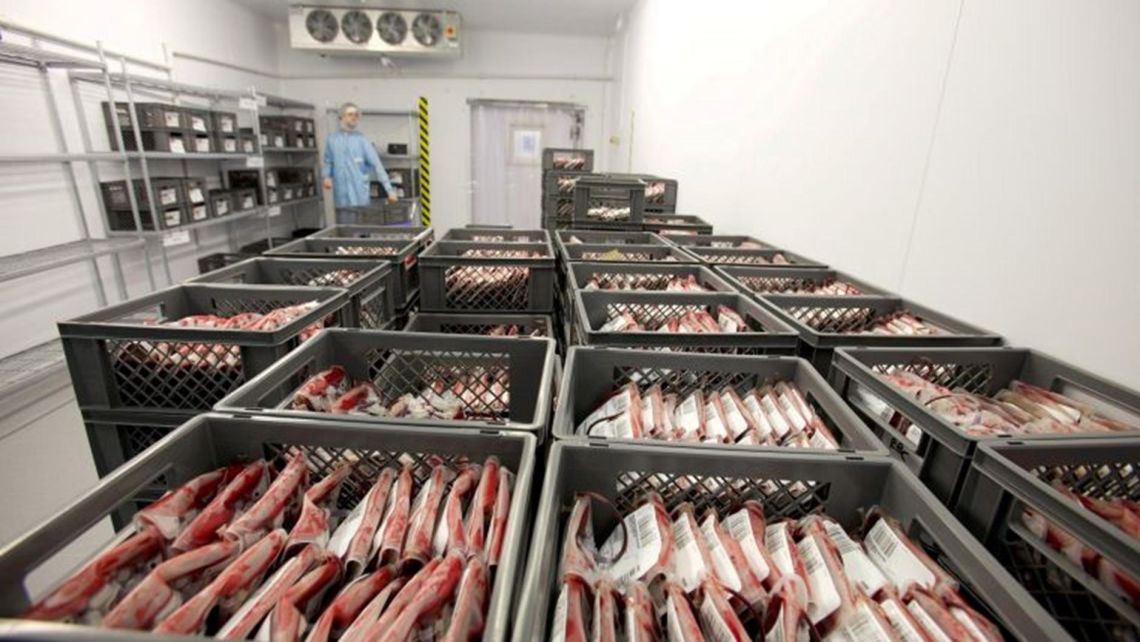

FlowScore (1) – a formula developed at Oxford University in collaboration with NHS Blood and Transplant – predicts how quickly red blood cells release their oxygen. This process is important for oxygenating the body’s tissues, including organs and muscles, particularly in people receiving large transfusions.
Healthy fresh red blood cells have a distinctive biconcave – or dumbbell – shape for efficient oxygen release. During refrigerated storage, red cells become energetically stressed and more spherical, which slows oxygen release. Using transplant kidneys, researchers at Oxford showed that perfusion with blood units that had undergone storage-related kinetic rundown was associated with poorer oxygen delivery, and that this could be restored by biochemically rejuvenating – or refreshing – the blood.
Factors affecting oxygen release from red cells were described at Oxford’s Department of Physiology, Anatomy, and Genetics but the testing method was too laborious for routine use in blood agencies working to improve the monitoring of blood stored for transfusion. To adapt the research findings to blood banking, NHS Blood and Transplant’s Component Development Laboratory joined the project, providing blood samples stored according to NHS protocols and measurements from haematology analysers.
During routine blood counts, haematology analysers use flow cytometry – a method that passes cells through a laser beam to study their characteristics. When light hits a cell, the pattern of scattering reveals information about their size and shape. It was found that this information accurately predicts oxygen release from red blood cells, and the predictive formula was called FlowScore (2)(3). The innovation makes measurements of red cell oxygen transport simpler, faster, and more accessible for laboratories worldwide.
Read the full story on the Department of Physiology, Anatomy and Genetics website.
more recommended stories
 Nanoplastics in Brain Tissue and Neurological Risk
Nanoplastics in Brain Tissue and Neurological RiskKey Takeaways for HCPs Nanoplastics are.
 AI Predicts Chronic GVHD Risk After Stem Cell Transplant
AI Predicts Chronic GVHD Risk After Stem Cell TransplantKey Takeaways A new AI-driven tool,.
 Red Meat Consumption Linked to Higher Diabetes Odds
Red Meat Consumption Linked to Higher Diabetes OddsKey Takeaways Higher intake of total,.
 Pediatric Crohn’s Disease Microbial Signature Identified
Pediatric Crohn’s Disease Microbial Signature IdentifiedKey Points at a Glance NYU.
 Nanovaccine Design Boosts Immune Attack on HPV Tumors
Nanovaccine Design Boosts Immune Attack on HPV TumorsKey Highlights Reconfiguring peptide orientation significantly.
 High-Fat Diets Cause Damage to Metabolic Health
High-Fat Diets Cause Damage to Metabolic HealthKey Points Takeaways High-fat and ketogenic.
 Acute Ischemic Stroke: New Evidence for Neuroprotection
Acute Ischemic Stroke: New Evidence for NeuroprotectionKey Highlights A Phase III clinical.
 Statins Rarely Cause Side Effects, Large Trials Show
Statins Rarely Cause Side Effects, Large Trials ShowKey Points at a Glance Large.
 Anxiety Reduction and Emotional Support on Social Media
Anxiety Reduction and Emotional Support on Social MediaKey Summary Anxiety commonly begins in.
 Liquid Biopsy Measures Epigenetic Instability in Cancer
Liquid Biopsy Measures Epigenetic Instability in CancerKey Takeaways Johns Hopkins researchers developed.

Leave a Comment